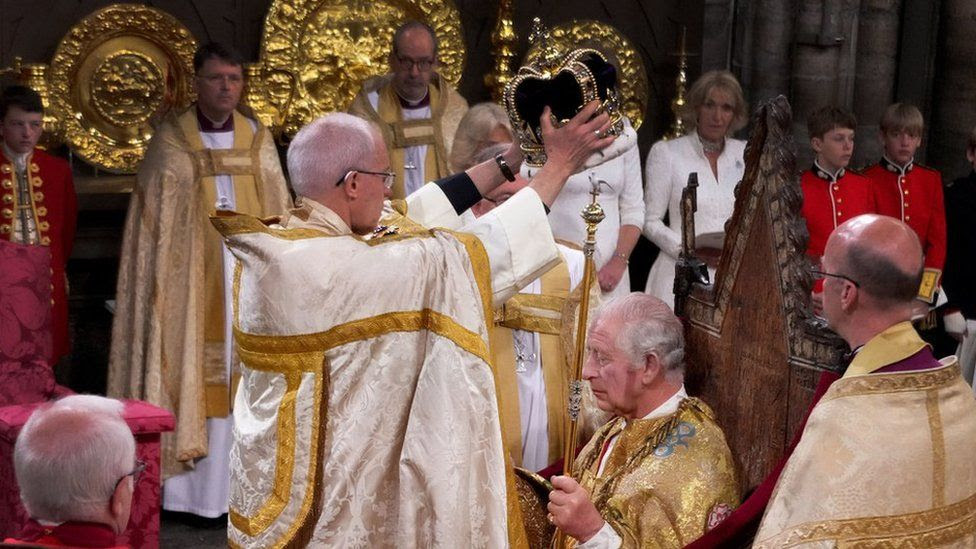 IMAGE SOURCE,PA MEDIA
IMAGE SOURCE,PA MEDIA
Image caption,
The moment the Archbishop of Canterbury placed St Edward’s Crown on the King
King Charles III receives the St Edward’s Crown during his coronation ceremony in Westminster Abbey, London on May 6, 2023.
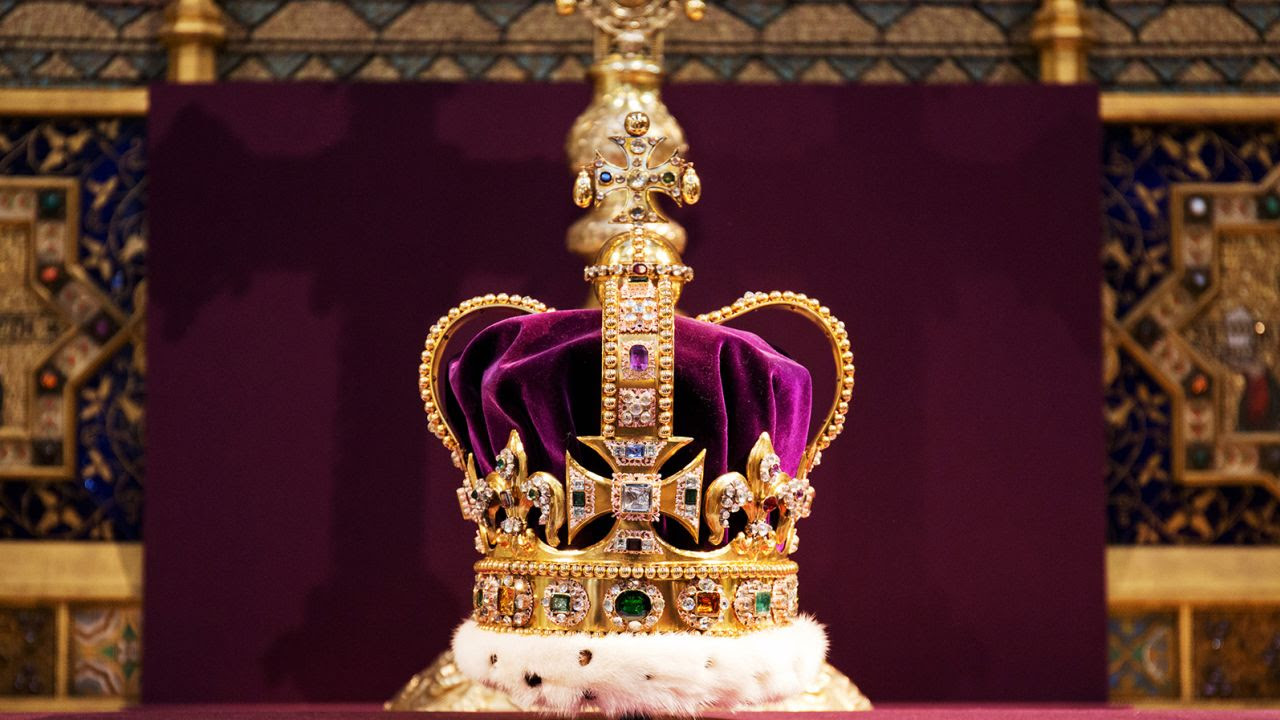
St. Edward’s Crown is considered the centerpiece of the coronation because it’s used at the exact moment of crowning.
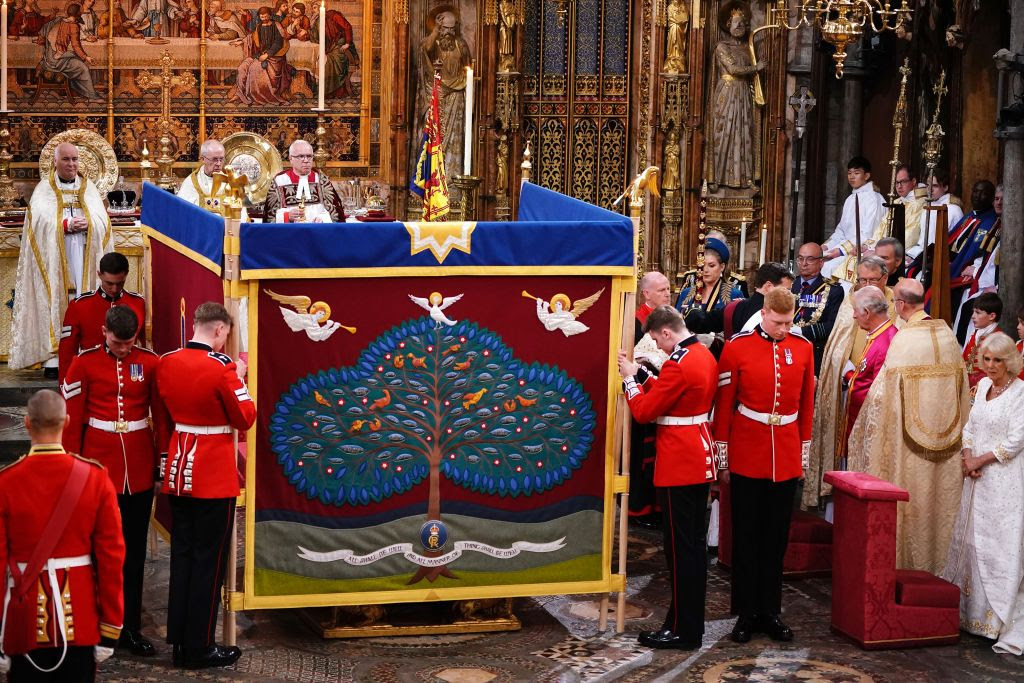
WPA Pool//Getty Images
ANOINTING TOOK PLACE BEHIND HOLY CURTAINS
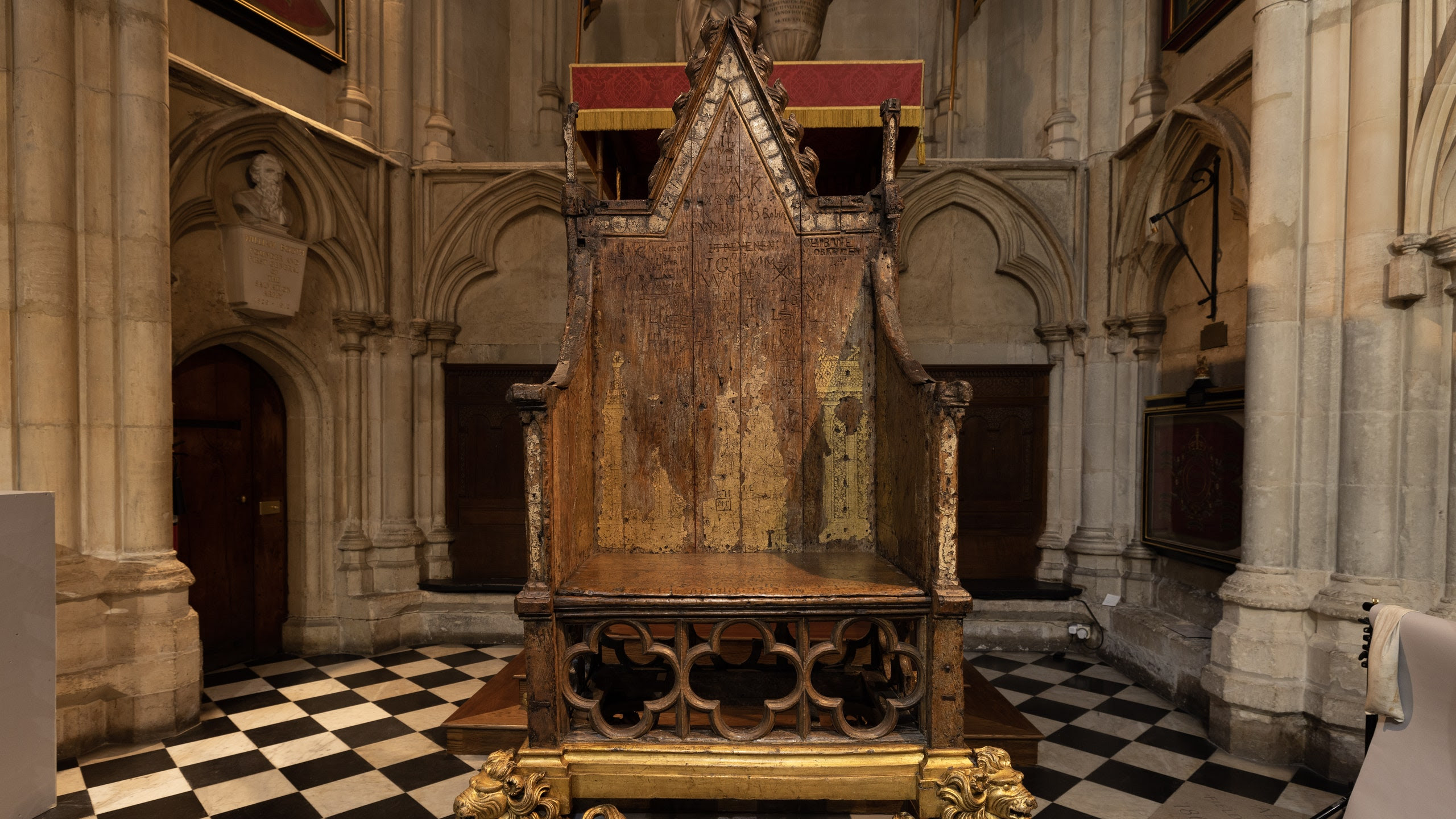
The coronation chair is kept inside Westminster Abbey in London.Photo: Dan Kitwood – PA Images/Getty Images
700 YEARS OLD CORONATION CHAIR!
 Fig 3: The north-transept façade of the Abbey offered the most direct connection between the Palace and the Abbey. The reconstruction of the nave continued into the 15th century. Westminster Abbey photographed for Country Life magazine by Paul Highnam.
Fig 3: The north-transept façade of the Abbey offered the most direct connection between the Palace and the Abbey. The reconstruction of the nave continued into the 15th century. Westminster Abbey photographed for Country Life magazine by Paul Highnam.
WESTMINSTER ABBEY, THE CROWNING PLACE OF ENGLISH KINGS
SINCE EDWARD THE CONFESSOR!

Coronation of Harold II at Westminster Abbey in 1066, from the Bayeux Tapestry
Coronation of Harold II at Westminster Abbey in 1066, from the Bayeux Tapestry
[KING HAROLD WAS THE LAST CROWNED ENGLISH ANGLO-SAXON KING,
BROTHER IN LAW OF KING EDWARD THE CONFESSOR
KING HAROLD WAS DEFEATED BY WILLIAM THE CONQUEROR,
DUKE OF NORMANDY IN THE BATTLE OF HASTINGS IN 1066
AND SO THE HOUSE OF NORMANDY STARTED AS ENGLISH MONARCHY FROM WHICH ALL
SUBSEQUENT ENGLISH KINGS DESCEND
FROM WIKIPEDIA
CORONATION OF KING CHARLES III/”I COME NOT TO BE SERVED, BUT TO SERVE”
CORONATION OATH OF KING CHARLES III
The King stands and the Archbishop says:
”Our Majesty, the Church established by law, whose settlement you will swear to maintain, is committed to the true profession of the Gospel, and, in so doing, will seek to foster an environment in which people of all faiths and beliefs may live freely. The Coronation Oath has stood for centuries and is enshrined in law.
Are you willing to take the Oath?
The King replies
I am willing.
The King places his hand on the Bible, and the Archbishop administers the Oath
Will you solemnly promise and swear to govern the Peoples of the United Kingdom of Great Britain and Northern Ireland, your other Realms and the Territories to any of them belonging or pertaining, according to their respective laws and customs?
The King replies
I solemnly promise so to do.
The Archbishop says
Will you to your power cause Law and Justice, in Mercy, to be executed in all your judgements?
The King replies
I will.
The King kneels at the Chair of Estate. The Archbishop says
Will you to the utmost of your power maintain the Laws of God and the true profession of the Gospel? Will you to the utmost of your power maintain in the United Kingdom the Protestant Reformed Religion established by law? Will you maintain and preserve inviolably the settlement of the Church of England, and the doctrine, worship, discipline, and government thereof, as by law established in England?
And will you preserve unto the Bishops and Clergy of England, and to the Churches there committed to their charge, all such rights and privileges as by law do or shall appertain to them or any of them?
The King replies
All this I promise to do.
The King places his hand on the Bible and says
The things which I have here before promised, I will perform and keep. So help me God.
The King kisses the Bible. The Archbishop says
Your Majesty, are you willing to make, subscribe, and declare to the statutory Accession Declaration Oath?
The King replies
I am willing.
I Charles do solemnly and sincerely in the presence of God profess, testify, and declare that I am a faithful Protestant, and that I will, according to the true intent of the enactments which secure the Protestant succession to the Throne, uphold and maintain the said enactments to the best of my powers according to law.
The King signs copies of the Oaths, presented by the Lord Chamberlain,whilst the choir sings
Prevent us, O Lord, in all our doings with thy most gracious favour, and further us with thy continual help; that in all our works begun, continued, and ended in thee, we may glorify thy holy name, and finally by thy mercy obtain everlasting life; through Jesus Christ our Lord. Amen.
God of compassion and mercy whose Son was sent not to be served but to serve, give grace that I may find in thy service perfect freedom and in that freedom knowledge of thy truth. Grant that I may be a blessing to all thy children, of every faith and belief, that together we may discover the ways of gentleness and be led into the paths of peace; through Jesus Christ our Lord. Amen.
The King returns to the Chair of Estate and sits.
On 6 May 2023, the Coronation of Charles III, King of the United Kingdom and
the Commonwealth Realms, took place. [1]
Actually, he acceded the throne on 8 september 2022, upon the death of his mother, Queen Elizabeth II [2]
At the age of 73, he became the oldest person to accede to the British throne, after having been the longest heir apparent and Prince of Wales in British history [3]
His coronation took place at Westminster Abbey, where traditionally
the English monarchs are crowned, [4]
Simultaneously, his wife, Queen Camilla, was also crowned [5],
as is usually the case [6]
ANCIENT MONARCHY/ANCIENT TRADITIONS
A QUICK WALK WITH ASTRID ESSED THROUGH HISTORY!
What I love about this Coronation [and those before] are
the old traditions, which is logically, since the English kings
stand in an impressive tradition of more than thousand years!
The eldest Royal House I can recall is the House of Wessex, in
899 to begin with, under king Alfred the Great! [7]
Before the House of Wessex under Alfred the Great, there was the
”old” House of Wessex, founded by Cerdic of the Gewisse [The West Saxon dynasty], but in those times England was not united, but
consisted of different kingdoms [8]’
[By the way, The House of Wessex was by times interrupted
by the House of Denmark, when England was under Danish control] [9]
It was under Alfred the Great, the first to call himself
”King of the Anglo Saxons [instead of just the West Saxons], that the first steps were
taken to unify England, which was completed by Alfred the Great’s
descendants. [10] The last king from the House of Wessex was king Edward the Confessor [11]I will refer to him later in this Coronation article, with respect to the
St Edward’s Crown”…….You will see, o Readers.
And the present English monarchy descents from William the Conqueror,the Duke of Normandy, who conquered England in the Battleof Hastings in 1066, defeating king Harold II [brother in lawof Edward the Confessor], the last Anglo Saxon king [12]
FASCINATING, when you realize, that the Dutch Monarchy only
exists since 1813, being one of the youngest monarchies in
Europe! [13]
I
THE CORONATION CEREMONY
A SACRED CEREMONY
The Coronation Ceremony is firstly a spiritual and sacred one.
But also one of traditional symbols.
Sacred are of course the Oath and the Anointing with the Holy Oil:
THE OATH
ANOINTING THE OIL [Behind Curtains]
THE OATH
The Coronation Ceremony of King Charles III was, like those of
his predecessors, firstly a SACRED Ceremony, which is seen, not only as performed by the Archbishop of Canterbury, but in the Kings’ Oath:[The Archbishop]”
Will you to the utmost of your power maintain the Laws of God and the true profession of the Gospel? Will you to the utmost of your power maintain in the United Kingdom the Protestant Reformed Religion established by law?”
[The King]
”All this I promise to do”
[And the King, placing his hand on the Bible]
”The things which I have here before promised, I will perform and keep. So help me God.” [14]
Now this Holy Oath has everything to do with the fact, that
king Charles III is Head of the Anglican Church [the Church of England] [15], which is tradition since king Henry VIII, who broke with thePope and subsequently the old Catholic Church [called
”Holy Church” in Medieval England] [16]
Yet apart from that breach with the Holy Church, Coronation Ceremonies were always sacred:
See a part from the Oath that king Edward II, one of the forefathers
of king Charles III, took at his Coronation in 1308:[English translation from the original French text]”
Sire, will you in all your judgments, so far as in you lies, preserve to God and Holy Church, and to the people and clergy, entire peace and concord before God?
[Edward II]
I will preserve them.[17]
HOWEVER:Oaths, based on the Church of England or on the Catholic Holy Church or not, those Sacred Customs were all based on the concept ofSacred Kingship, or in Western history: the concept of theDivine Right of Kings [18], which also has a pre Christian tradition [19] and is a universal concept from Old Historian Times. [20]
Because in old Times [and perhaps the divine right of kingsis based upon that] there was that concept of a king, who wasalso high priest [21]
II
ANOINTING THE OIL [SPIRITUAL]
The English Coronation Ceremonies are ancient, very ancient,and main elements of
the coronation service and the earliest form of oath can be traced to the ceremony devised by Saint Dunstan for King Edgar’s coronation in 973 AD at Bath Abbey.
It drew on ceremonies used by the kings of the Franks and those used in the ordination of bishops.[22]
But that was then.
Through the centuries, there were different versions of coronation
services [23], but untill the Reformation, based on catholic traditions [24]
With the Reformation, there were changes [25], but some things,
especially regarding the Place of Coronation, the Holy Oil Anointing,
the Crown, the Chair and other traditions, remained largely unchanged.
I refer to those in a moment, a five minutes reading!
ANOINTING THE OILA MOST SACRED CEREMONY, STEMMING FROM THE BIBLE!
The anointing is the most sacred part of the coronation ceremony, and takes place before the crowning.
The Archbishop pours holy oil from the Ampulla (or vessel) into the spoon, and anoints the sovereign on the hands, breast and head [26]
And this Anointing Tradition is based on
the Old Days, especially Biblical Ones!
I refer to the Old Testimony, Book ”Kings”
and quote about the Coronation of King Salomon:
”Then Zadok the priest took a horn of
oil from the tabernacle and anointed Solomon. And they blew the horn, and all the people said, “Long live King Solomon!”
[Book ”Kings” 1:39] [27]
Anointing was one of the medieval holy sacraments and it emphasised the spiritual status of the sovereign. Until the seventeenth century the sovereign was considered to be appointed directly by God and this was confirmed by the ceremony of anointing. Although the monarch is no longer considered divine in the same way, the ceremony of Coronation also confirms the monarch as the Supreme Governor of the Church of England. [28]
BEHIND CURTAINS
And since the anointing is considered as that holy
and sacred, it is NOT for others to see, but hidden for public view.
To hide the anointing for public, king Charles III’s
mother, Queen Elizabeth II, used a canopy, while
king Charles III kicked things up a notch with a full-blown screen [29]
Like I said before, the Coronation Ceremony
is firstly a sacred and religious One and emphasizing
the Divine Right of Kings [although that Divine Right Concept is ancient
and historical], the anointing has to be done in private!
See for important facts and events about the Coronation Ceremonies of English kings since the
Anglo Saxon king Edgar [Reign, 959-975] [30], under note 31!Exciting, isn’t it!
THE ANOINTING OILCHANGED TIMES…..
Although the Anointing Ceremony of king Charles IIIwas largerly the same as his predecessors, there were some changes, especially in the use of the AnointingOil:
The holy oil that was traditionally used for coronations past contained civet oil, from the glands of the small mammals, and ambergris from whale intestines. The formula was used at Queen Elizabeth’s ceremony and is hundreds of years old. [32]
However, the holy oil that will be used at Charles’ coronation is vegan-friendly, in order to reflect modern anti-animal cruelty sentiments. It is made with olive oil, pressed just outside Bethlehem, and perfumed with essential oils such as sesame, rose, jasmine, cinnamon, neroli, benzoin and amber and orange blossom. [33]A 21st Century Monarch, Changed timesBut the Essentials of the Coronation are still maintained, despite different personal touchs ofkings throughout the centuries [and sometimes memorable things happened at Coronations] [34] and the change fromthe old Holy Church to the present, protestant Church of England. [35]
III
WESTMINSTER ABBEY
Interesting historical tradition is, that sincethe ancestor of all English kings [after his conquest ofEngland in 1066], William the Conqueror, allEnglish kings have been crowned at WestminsterAbbey [36] [although according to some sources, the lastAnglo Saxon king, Harold II, who was defeated byWilliam the Conqueror, was also crowned at Westminster Abbey [37]Although…[and forgive me Readers, that my historicalheart takes it over again….] there were apart crowning ceremonies….Because king Henry III, father of the more famous king Edward I and [I mean king Henry III] the son of king John I [alsomentioned ”Lackland”, a brother of kingRichard Coeur de Lion and a greatgreatgrandsonof William the Conqueror] [38], that king Henry III was crowned twice!Firstly at Gloucester Cathedral in 1216 and only in 122o at Westminster Abbey! [39]REASON?When Henry’s father, king John died [Henry was only nine years old], there was stilla rising of noblemen against his father’s government, ”the War with the Barons”, which by the way resulted in the Magna Charta [40]And to make things worse, there was a French invasionalso See for more information, note 41So Henry III was hastily crowned in Gloucester Cathedral in 1216, since at that moment the French occupied London and after more stable times, in 122oin Westminster Abbey! [42]And to make it more fascinating than it already was…..When king Henry had been crowned for the first time,THERE WAS NO ROYAL CROWN!Because during the Baron’s War the Crown had been lost, probably lost as king John crossed oneof the tidal estuaries which empties into the Walsh,being sucked in by quicksand and whirpools…[43]So at his first Coronation, Henry had no Crown andtherefore was crowned with a golden Corolla[headdress] [44], belonging to his mother Isabella ofAngouleme! [45]Interesting, isn’t it?
IV
ST EDWARD’S CROWN!We’ll stay in the king Henry III times awhile! Because when he was crowned at the second time,and now in Westminster Abbey [See above], he neededa real crown, since his father John’s crown was lost during the Baron’s War.And since king Henry III was a great admirer of Edward the Confessor, one of the last Anglo Saxon kings [the direct predecessor of King Harold, the king who was defeated by William the Conqueror in 1066], he calledthe crown, that was made for him ”St Edward’s Crown”[46]According to some sources it really WAS the crownof Edward the Confessor, but that is open todiscussion I think [47]HOWEVER, the crown with which king Charles III iscrowned, is called ”St Edward’s Crown, but not theoriginal, since a new Crown was made for king Charles II, since after the deposition and executionof his father King Charles I most of the British CrownJewels, the Crown included, were destroyed, broken upor sold off. [48]So the Crown, that is used by the Coronationof king Charles III is the crown of king Charles II from the 17th Century! [49]
V
CORONATION SPEECH IN ENGLISH!
What I found really exciting to learn was this:KingHenry IV, who by the way usurped the thronefrom his cousin Richard II [50] which eventually would cause the Wars of the Roses [51], was the firstEnglish king, who at his Coronation made a speechin English! [52]
Before this, the official language of the court was French, ever since William I conquered England [53]
VI
MORE TRADITIONS AND SYMBOLS AT THE CORONATION
CEREMONY/THE SPOON, THE ANCIENT SPOON!
THE SPOON
What makes the Coronation so fascinating, are,
as I said before, the ancient traditions.
Like the use of the Coronation Spoon, dated from the 12th century and probably made for either king
Henry II or his son king Richard Coeur de Lion
[respectively the father and brother of king John, alsonamed ”Lackland”, from whom all present Englishkings descent] It is also the only
piece of royal goldsmiths’ work to survive from the 12th century! [54]
So unique!
The spoon is first recorded in 1349 as preserved among St Edward’s Regalia in Westminster Abbey. Already at this date it is described as a spoon of ‘antique forme’ [55]
About the role of the Coronation Spoon:
The Archbishop pours holy oil from the Ampulla (or vessel) [the ampulla was made for the
Coronation of king Charles II] into the spoon, and anoints the sovereign on the hands, breast and head. [56]
Interesting is, that the Spoon may originally have been used for mixing wine and water in a chalice, but it was certainly used for anointing the sovereign during the coronation of James I in 1603, son of the executed Mary, Queen of Scots, successor
of Queen Elizabeth I and the first Sovereign from the House of
Stuart and a unified England and Scotland, and at every subsequent coronation. [57]
VII
THE CHAIR/THE CORONATION CHAIR!
Also a very ancient and fascinating symbol
is the 700 years old Coronation Chair!
The Coronation Chair was made by order of Edward I [58] to enclose the famous Stone of Scone [59], which he brought [stole, remark bij Astrid Essed see note 60] from Scotland to the Abbey in 1296, where he placed it in the care of the Abbot of Westminster.
The Stone of Scone had been used by Scottish kings for centuries to sit upon when they were crowned! [61]
The Chair has been in use at the coronation ceremony since 1308 although opinion is divided as to when it was actually used for the crowning, but this was certainly the case from 1399 when
Henry IV was crowned in the Chair. [62]And after king Henry IV, nearly all English kings were crownedin that Chair [63] Just fascinating, when you think that the present king Charles III is crowned in a Chair, that his ancestor king Edward I has ordered to make at the beginning of the 14th century! [64]
VIII
AND LAST, BUT NOT LEAST:THE KING’S CHAMPION!
I described some fascinating symbols and aspects ofthe Coronation, which is [see above] a Sacred CeremonySee about yet more details, note 65
However, the last fascinating aspect I want to share with you,o Readers, is ….”The King’s Champion!”……. which is atypically Medieval symbol! [66]
As far as my investigation reaches, King’s Championtraditions stems from William the Conqueror, that Duke of Normandy, who conquered England in 1066 and laid the foundation of the present British Monarchy [all subsequent kingsare his descendants] [67]
This is how it went and how the King’s Champion tradition took shape:
When William, the Conqueror seized the English throne in 1066, he asked his friend Robert Marmion to act as his Champion. Marmion’s role was to literally throw down the gauntlet, openly challenging anyone doubting the new king’s legitimacy, to prove their case through armed combat. [68]
This was not a formality or a mere ceremony in the Middle Ages, but,
given the violent times then, a real Danger……
To make a long story short, out of gratitude for risking his life, Marmion was given an estate at Scrivelsby, in
Lincolnshire.
The grant for this sets out that:
”The manor of Scrivelsby is holden … the service of finding on the day of Coronation, an armed knight who shall prove by his body, if need be, that the King is true and rightful heir to the kingdom.” [69]
Interesting is, that over the centuries, not only
the tradition of ”The King’s Champion” survived, but
that the role of King’s Champion remained with
Marmion’s descendants, who, since 1350, have been
the Dymoke Family [70]
Their family motto is the Latin phrase ”Pro Rege Dimico”
a play on their name, implying ”I contend for the King” [71]
See under note 72 the role of the Dymoke Family at theCoronation of King Edward IV [during the Wars of the Roses, with the Astrid Essed remark, that the PlantagenetBranch of the House of Edward IV, the House of York,had a superior claim to the English throne [73]
THE KING’S CHAMPION IN ACTION!
I already referred to the violent ancient times in whichthe role of the King’s Champion was notjust a ceremony.The last time however, the King’s Champion reallyperformed the ancient role of throwing down the gauntletwas at the coronation of King George IV! [74]
THE KING’S CHAMPIONMODERN TIMES
We are living in modern times now and F
rancis Dymoke won’t ride into King Charles III’s coronation on horseback and challenge any pretender to the throne to single combat as his ancestor did in 1066, but he will carry the Royal Standard into Westminster Abbey. [75]
Dymoke, a 67-year-old farmer from eastern England, will be the King’s Champion at the coronation, fulfilling a role performed by members of his family since William the Conqueror was crowned nearly 1,000 years ago……
An old tradition, anyway, although not so ”romantic” anymore
like in the ancient times……
Although I like Dymoke’s comment on his ceremonial
role as ”King’s Champion”
”“This is the one moment in my life that really matters,” ,
as he had told the Daily Telegraph [76]
Apart from the modern times we live in, one of
the reasons the King’s Champion doesn’t fullfill his
original role is this:
The King’s Champion originally rode into the coronation banquet on horseback, threw down a gauntlet and challenged anyone who doubted the king or queen’s right to rule.
BUT:
there hasn’t been a coronation banquet since 1821, so Champions now perform other roles, usually bearing a flag or standard, the palace said. [77]
MODERN TIMES…..END
You and I, readers, have watched the Coronation ofthe new English king, Charles III [78], followedthe symbols and traditions.Travelled through the Ages in which the Coronationstook shape, with the fascinating history of the CrownJewels, the 12th century Coronation Spoon, the 700years old Coronation Chair, the St Edward’s Crown,the King’s Champion, all those ancient andmeaningful traditions, from the Middle Ages untillModern Times.
Much is changed, yet the tradition and the Bond with History remains.I will end with the words, king Charles III uttered at his Coronation:”I come not to be served, but to serve” [79]
Readers, it was nice to travel with you to history againand….end in those modern times!
Hope you enjoyed it [I CERTAINLY DID!]
See to my next article
Then I travel with you to the Middle Ages againThe Time of the Wars of the Roses!
My next article will be about Richard Neville, the 16th Earl of Warwick, the Kingmaker! [80]
See you then
ASTRID ESSED
NOTES
NOTES 1 AND 2
NOTES 3 T/M 6
NOTES 7 T/M 13
NOTE 14
NOTES 15 AND 16
NOTE 17[CORONATION OATH OF KING EDWARD II]
NOTES 18 T/M 20
NOTES 21 AND 22
NOTES 23 T/M 25
NOTES 26 AND 27
NOTES 28 AND 29
NOTES 30 AND 31
NOTES 32 AND 33
NOTES 34 AND 35
NOTES 36 AND 37
NOTES 38 T/M 42
NOTES 43 T/M 45
NOTES 46 T/M 49
NOTES 50 T/M 53
NOTE 54
NOTES 55 T/M 57
NOTES 58 T/M 64
NOTE 65
NOTES 66 T/M 77
NOTES 78 T/M 80
FINISHED!

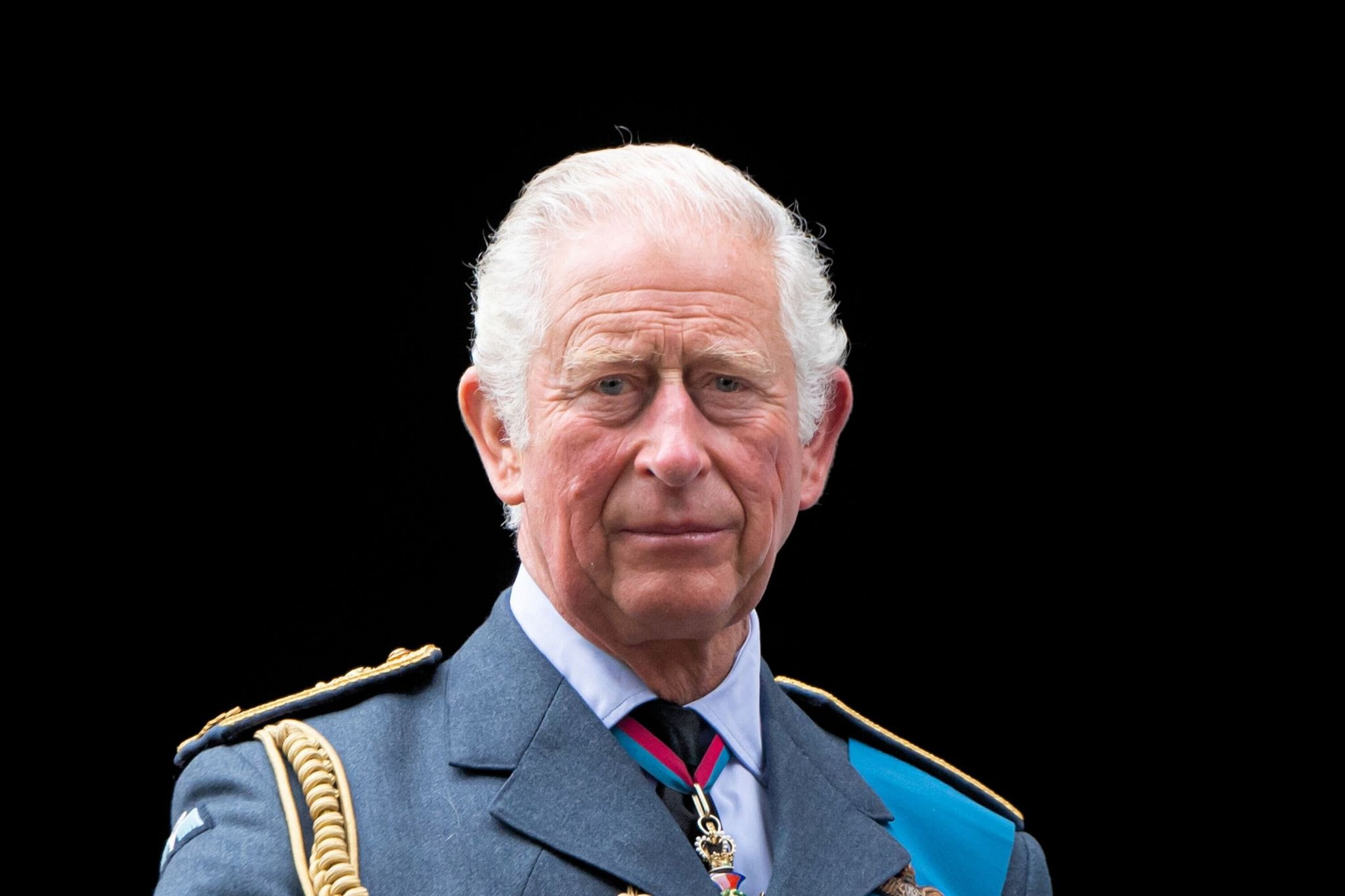 IMAGE SOURCE,GETTY IMAGES
IMAGE SOURCE,GETTY IMAGES